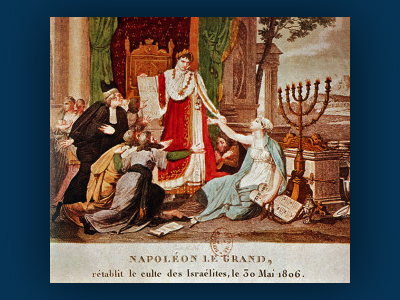January 28, 1790
Sephardi Jews living in France are granted equal rights and given French citizenship by the National Assembly. In December 1789, after the French Revolution and the Declaration of the Rights of Man, the issue of Jewish rights was debated in the National Assembly for three days with no conclusion reached.
The December 1789 debate included the view that the Jews were and always would be a separate and distinct nation, as articulated by Abbe Jean Siffrein Maury. He declared before the Assembly on December 23, 1789: “I observe first of all that the word Jew is not the name of a sect, but of a nation that has laws which it has always followed and still wishes to follow. Calling Jews citizens would be like saying that without letters of naturalization and without ceasing to be English and Danish, the English and Danish could become French.”
On the other hand, the radical Robespierre argued, “The evil qualities of the Jews emanate from the degree of humiliation to which you have subjected them. … Any citizen who fulfills the conditions you have laid down has the right to public office.”
In January 1790, facing acts of violence from their Christian neighbors, the Jewish residents of Alsace and Lorraine petitioned the National Assembly for French citizenship. This plea from the Ashkenazi Jews of eastern France, representing the majority of French Jewry, was not granted. But the National Assembly decides to grant equality to “all of the Jews known in France under the name of Portuguese, Spanish and Avignonese Jews.” These Sephardim, descended from Conversos who migrated to France in the 16th century, speak French, interact with Christians in business and dress like their French neighbors. As a result of their different social standing, the National Assembly recognizes them as distinct from the majority of French Jewry.
After nearly two more years of debate, French Ashkenazim are granted emancipation in September 1791. The French emancipation debate highlights the precarious existence and national character of European Jews in the century before the modern Zionist movement.










